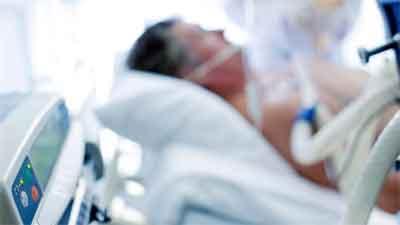- Home
- Editorial
- News
- Practice Guidelines
- Anesthesiology Guidelines
- Cancer Guidelines
- Cardiac Sciences Guidelines
- Critical Care Guidelines
- Dentistry Guidelines
- Dermatology Guidelines
- Diabetes and Endo Guidelines
- Diagnostics Guidelines
- ENT Guidelines
- Featured Practice Guidelines
- Gastroenterology Guidelines
- Geriatrics Guidelines
- Medicine Guidelines
- Nephrology Guidelines
- Neurosciences Guidelines
- Obs and Gynae Guidelines
- Ophthalmology Guidelines
- Orthopaedics Guidelines
- Paediatrics Guidelines
- Psychiatry Guidelines
- Pulmonology Guidelines
- Radiology Guidelines
- Surgery Guidelines
- Urology Guidelines
New test can predict if coma patient will wake up in a year

Washington : Scientists have found a new way to measure the level of awareness in a brain injured person who is in coma, and predict whether they will recover consciousness within a year.
The precise diagnosis and prognosis of recovery of consciousness of patients after a severe brain injury is a challenging clinical task, as some brain-injured patients retain certain levels of awareness despite appearing fully unresponsive.
Scientists have found that readily obtainable measures of the amount of glucose (sugar) consumed by the brain can directly predict a person's current level of awareness, or the likelihood that they will recover awareness within a year.
"In nearly all cases, whole-brain energy turnover directly predicted either the current level of awareness or its subsequent recovery," said Ron Kupers from the Yale University in the US.
"Our findings indicate that there is a minimal energetic requirement for sustained consciousness to arise after brain injury," said Kupers.
Researchers aimed to develop reliable diagnostic markers for the assessment of current and future levels of awareness to complement routine bedside clinical examinations.
They quantified and mapped cerebral glucose metabolism in 131 brain-injured patients, all of whom were suffering from either full or partial loss of consciousness.
The researchers measured glucose metabolism using an imaging technique in which glucose labelled with a radioactive tracer molecule is injected into the bloodstream.
The results showed that the patients' individual levels of behavioral responsiveness were strongly linked to their overall cerebral energy turnover.
Patients with glucose metabolism below a well-defined threshold of 42 per cent of normal cortical activity appeared to be fully unconscious and did not recover consciousness at one-year follow-up.
In contrast, nearly all patients with brain metabolic activity above this energetic threshold either showed signs of awareness at the initial examination or had recovered responsiveness a year later.
The cerebral metabolic rate accounted for the current level or imminent return of awareness in 94 per cent patients.
"The discovery of a clear metabolic boundary between the conscious and unconscious states could imply that the brain undergoes a fundamental state change at a certain level of energy turnover, in a sense that consciousness 'ignites' as brain activity reaches a certain threshold," said Johan Stender, University of Copenhagen in Denmark.
"The take-home message (for now) is that consciousness is a highly energy demanding process, involving the brain at large," Kupers said.
"This fundamental physiological trait can help clinicians determine the potential for recovery of awareness in patients suffering from severe brain injuries of any kind," he said.
The research was published in the journal Current Biology.

Disclaimer: This site is primarily intended for healthcare professionals. Any content/information on this website does not replace the advice of medical and/or health professionals and should not be construed as medical/diagnostic advice/endorsement or prescription. Use of this site is subject to our terms of use, privacy policy, advertisement policy. © 2020 Minerva Medical Treatment Pvt Ltd